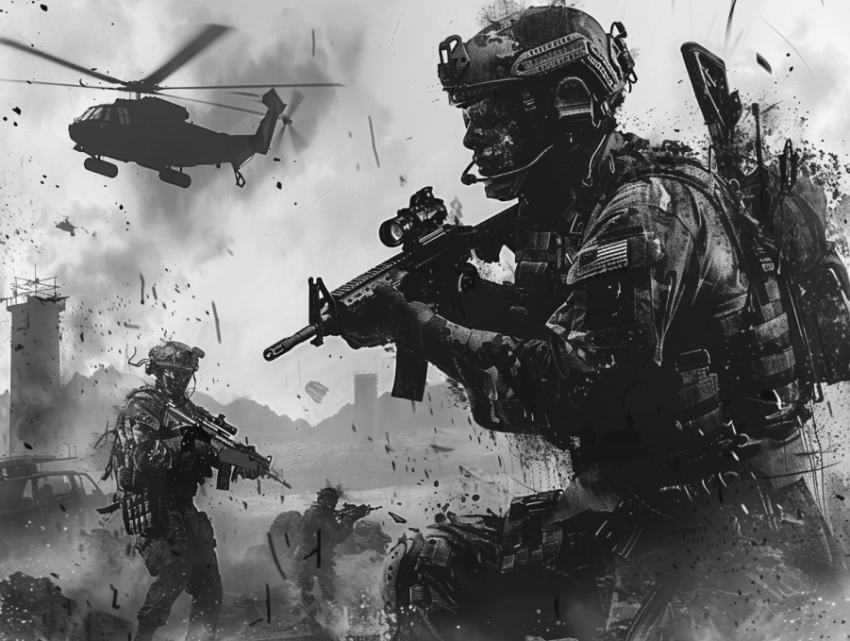











Call of Duty: The Evolution of a Military Shooter Phenomenon
Call of Duty is a first-person shooter video game franchise that has become a global phenomenon, captivating millions of players with its intense action, realistic settings, and compelling multiplayer experiences. Since its debut in 2003, Call of Duty has evolved from its World War II roots to encompass a wide range of historical and fictional conflicts, becoming one of the best-selling and most influential video game franchises of all time.
1. Early Years: World War II Roots (2003-2006)
- The first Call of Duty game, developed by Infinity Ward and published by Activision, was released in 2003 for Microsoft Windows.
- It was set during World War II and offered a gritty and realistic portrayal of combat, focusing on the experiences of individual soldiers.
- Call of Duty was praised for its immersive gameplay, cinematic presentation, and innovative features like the ability to aim down the sights of weapons.
- Call of Duty 2 (2005) expanded on the success of the original, featuring improved graphics, larger-scale battles, and a more refined multiplayer mode. It was released on Windows and the Xbox 360.
- Call of Duty 3 (2006) was developed by Treyarch and took the series to the Pacific theater of World War II. It was the first main series game not released on PC.
2. Modern Warfare Era: A Paradigm Shift (2007-2011)
- Call of Duty 4: Modern Warfare (2007), developed by Infinity Ward, marked a major turning point for the franchise.
- It shifted the setting from World War II to a contemporary conflict, featuring modern weapons, equipment, and a fictional storyline involving a global conspiracy.
- Modern Warfare's multiplayer mode was revolutionary, introducing features like killstreaks, perks, and a deep progression system that kept players engaged for hours on end.
- Call of Duty: World at War (2008), developed by Treyarch, returned to the World War II setting and introduced the popular Nazi Zombies cooperative mode.
- Call of Duty: Modern Warfare 2 (2009) continued the story of Modern Warfare and further refined the multiplayer experience, becoming one of the best-selling games of all time.
- Call of Duty: Black Ops (2010), developed by Treyarch, explored the covert operations of the Cold War era and featured a branching storyline with multiple endings. It also expanded on the Zombies mode.
3. Expanding the Franchise: New Settings and Sub-Series (2011-Present)
- Call of Duty: Modern Warfare 3 (2011) concluded the Modern Warfare trilogy.
- Call of Duty: Black Ops II (2012) took the series to a near-future setting and featured a storyline with choices that affected the outcome of the game.
- Call of Duty: Ghosts (2013) introduced a new storyline and setting, focusing on a group of elite soldiers known as the Ghosts.
- Call of Duty: Advanced Warfare (2014), developed by Sledgehammer Games, introduced advanced movement mechanics like exosuits and jetpacks, adding a new dimension to the gameplay.
- Call of Duty: Black Ops III (2015) continued the Black Ops storyline and featured a cooperative campaign mode.
- Call of Duty: Infinite Warfare (2016) took the series to a futuristic space setting, featuring interstellar combat and zero-gravity environments.
- Call of Duty: WWII (2017) marked a return to the franchise's World War II roots, offering a more grounded and historical experience.
- Call of Duty: Black Ops 4 (2018) was the first Call of Duty game to not feature a traditional single-player campaign, focusing instead on multiplayer, Zombies, and a new battle royale mode called Blackout.
- Call of Duty: Modern Warfare (2019) was a reboot of the Modern Warfare sub-series, featuring a more realistic and gritty storyline and a revamped multiplayer mode.
- Call of Duty: Warzone (2020) is a free-to-play battle royale game that has become a massive success, attracting millions of players worldwide.
- Call of Duty: Black Ops Cold War (2020) returned to the Cold War setting of the original Black Ops.
- Call of Duty: Vanguard (2021) was another entry set in World War II.
- Call of Duty: Modern Warfare II (2022) is a sequel to the 2019 reboot.
- Call of Duty: Modern Warfare III (2023) continues the story from the previous entry.
4. Multiplayer: The Heart of Call of Duty
- Multiplayer has always been a core component of the Call of Duty franchise, and it's a major reason for the series' enduring popularity.
- Call of Duty's multiplayer is known for its fast-paced, action-packed gameplay, its deep progression system, and its wide variety of game modes, maps, and weapons.
- The introduction of killstreaks, perks, and weapon customization in Modern Warfare revolutionized the online shooter genre and influenced countless other games.
5. Zombies: A Cooperative Phenomenon
- The Zombies mode, first introduced in Call of Duty: World at War, has become a beloved staple of the franchise.
- It's a cooperative mode where players team up to fight off waves of increasingly difficult zombies, while also uncovering secrets and completing objectives.
- Zombies has evolved over the years, with new maps, characters, weapons, and gameplay mechanics being added in subsequent Call of Duty games.
6. Call of Duty: Mobile and Warzone: Expanding to New Platforms
- Call of Duty: Mobile (2019) brought the Call of Duty experience to mobile devices, offering a free-to-play multiplayer experience that has been downloaded hundreds of millions of times.
- Call of Duty: Warzone (2020) is a free-to-play battle royale game that integrates with the mainline Call of Duty titles, allowing players to compete in large-scale battles with up to 150 players.
7. The Impact of Call of Duty on the Gaming Industry
- Call of Duty has had a profound impact on the gaming industry, influencing countless other first-person shooters and setting new standards for online multiplayer experiences.
- The franchise has been a major commercial success, with each new installment consistently ranking among the best-selling games of the year.
- Call of Duty has also become a major force in esports, with professional leagues and tournaments attracting large audiences.
8. Controversies and Criticisms
- Call of Duty has faced criticism over the years for its violent content, its portrayal of war, and its impact on players.
- The franchise has also been accused of promoting a pro-military agenda and of glorifying violence.
- Some of the storylines have also been controversial, such as the "No Russian" mission in Modern Warfare 2.
Conclusion:
Call of Duty has evolved from its World War II roots to become a global gaming phenomenon, encompassing a wide range of settings, storylines, and gameplay experiences. Its fast-paced multiplayer, engaging campaigns, and popular Zombies mode have captivated millions of players worldwide. While the franchise has faced its share of controversies, its impact on the gaming industry is undeniable. As Call of Duty continues to evolve and expand to new platforms, it remains a dominant force in the world of interactive entertainment, shaping the first-person shooter genre and pushing the boundaries of what's possible in video games.
Call of Duty, Call of Duty: Modern Warfare, Call of Duty: Warzone, Call of Duty: Black Ops, Call of Duty: Vanguard, Call of Duty Mobile, Call of Duty history, best Call of Duty games, Call of Duty multiplayer, Call of Duty Zombies, Call of Duty campaign, Call of Duty esports, Call of Duty League, Modern Warfare 2, Warzone 2, Modern Warfare 3, Black Ops Cold War, Call of Duty: WWII, Call of Duty: Infinite Warfare, Call of Duty: Advanced Warfare, Call of Duty: Ghosts, Call of Duty: Black Ops II, Call of Duty: Black Ops III, Call of Duty: Black Ops 4, Call of Duty: Modern Warfare 3, Call of Duty: World at War, Call of Duty 2, Call of Duty 4: Modern Warfare, Infinity Ward, Treyarch, Sledgehammer Games, Activision.

